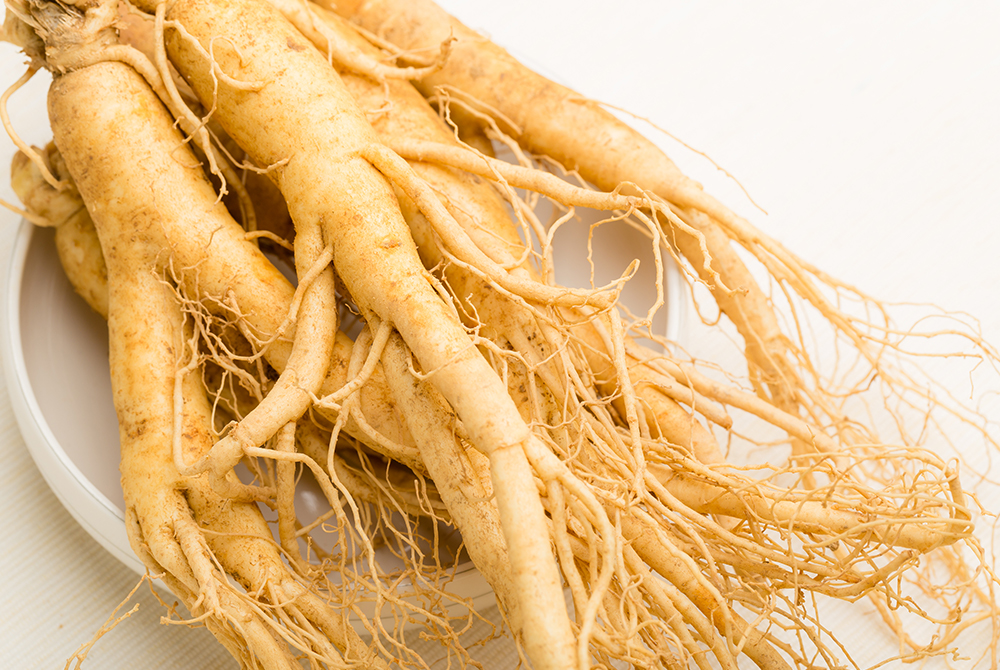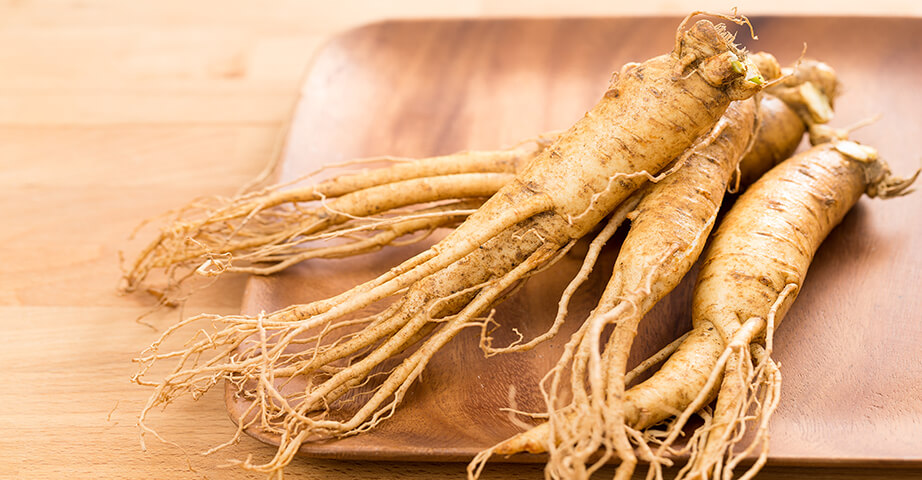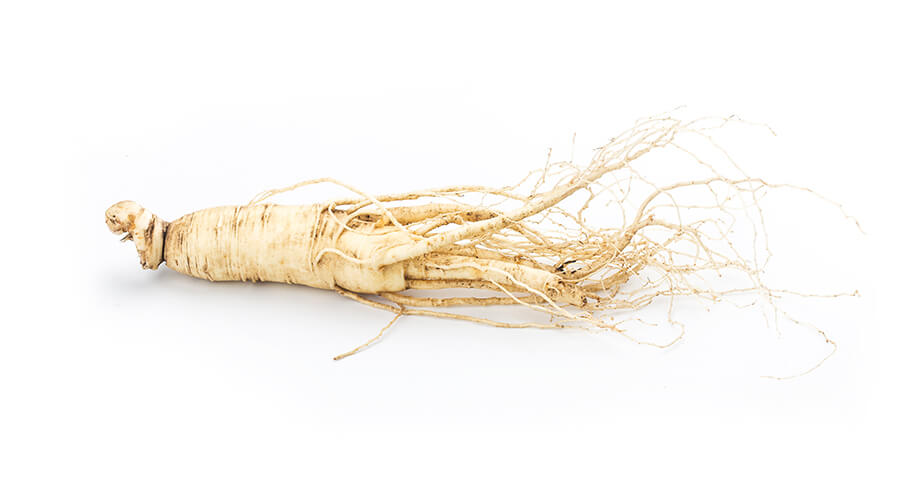
Ginseng (Panax) and Siberian ginseng are plants of completely different origins. They represent different species and have a different set of active ingredients, however, some of their features are similar. Both ginseng (Panax) and Siberian ginseng are classified as adaptogens - plant substances that can support the body in responding to everyday physical and emotional stress as well as reduce fatigue. How does Siberian ginseng differ from a traditional one? What health-promoting properties do these plants have? How to choose good ginseng supplements?
What is ginseng?
Ginseng is a popular plant in Chinese culture. It has probably been used for about 5,000 years. It is traditionally considered to be a plant that can cure everything. In Poland, ginseng is primarily known as a strengthening, adaptogenic and potency-boosting substance.
There are approximately 20 species of ginseng in the world, mainly in the Far East and North America. Ginseng belongs to the Panax species. The generic name is very meaningful and refers to the traditional uses of ginseng. „Panax” comes from the Greek "panakes" and means "medicine for everything". Ginseng roots, which are a medicinal raw material, often remind of a human body. In the past, it was believed that exactly these had the greatest health-promoting power.
The most popular ginseng species are:
- Panax ginseng – found in China, Korea and the eastern regions of Russia. Until the early 18th century, it was believed to be the only kind of this plant. Ginseng was first brought to Europe in 1000, but it took 600 years to become popular as a health-promoting drink of kings.
- American ginseng, or Panax quinquefolium – is found in North America in the mixed forests in the submontane areas. It was a raw material used by Native Americans. In 1704, a Canadian physician Michael Sarasin discovered a plant very similar to Asian ginseng, with similar properties. It was later named American ginseng.
Vietnamese ginseng, or red ginseng, is also widely recognised. What about Siberian or Indian ginseng? These names are also often heard, but these plants mentioned do not belong to the same genus as Panax and American ginseng. Giving them the same name refers to similar traditional uses, not to botanical origin. Indian ginseng is another name for ashwagandha, while Siberian ginseng is actually Eleutherococcus senticosus. All of them belong to the group of adaptogens.
Recommended products with ginseng
How does Siberian ginseng differ from true ginseng?
Ginseng and Siberian Ginseng are completely dissimilar plants with different origins and set of active ingredients.
- True ginseng belongs to the Panax genus and Siberian ginseng to Eleutherococcus
- To use true ginseng for dietary supplements, the roots of the plant need to grow between 5 and 9 years. In the case of Siberian ginseng, one year is sufficient, which makes it a less expensive and more accessible raw material. Therefore, supplements containing it should also be cheaper.
- Siberian ginseng roots are woody, while true ginseng roots are fleshy.
- The plants are found in other areas - Siberian ginseng in Siberia and Northeast China, while various Panax species are common in Asia and North America.
- What is most important, Siberian ginseng differs in the composition of its bioactive compounds from Panax ginseng. The most significant active ingredient of true ginseng and other representatives of this genus are ginsenosides. Siberian ginseng does not contain ginsenosides, and its main active ingredient is eleutherosides.
Siberian ginseng - properties and traditional uses
Siberian ginseng has traditionally been used to prevent colds and flu as well as to increase energy, longevity and vitality. It is believed to have adaptogenic properties. An adaptogen is a substance that is thought to help the body cope better with daily mental or physical stress. The term adaptogen is commonly used in Eastern medicine, but not officially accepted by Western science. Traditional uses of Siberian ginseng include regulating blood pressure, supporting the treatment of atherosclerosis, kidney disease, senile dementia, concentration and attention disorders, chronic fatigue, diabetes, dyslipidaemia, insomnia; improving sensation in the extremities (peripheral neuropathy), rheumatoid arthritis; reducing the effects of hangovers, flu, colds, chronic bronchitis and tuberculosis. Currently, numerous studies are being conducted to confirm or exclude the health-promoting properties attributed to Siberian ginseng.

What does scientific research say about the properties of Siberian ginseng?
- Siberian ginseng extract can be an effective treatment for the herpes virus, flu and the common cold.
- In vivo studies have shown that Siberian ginseng root extract reduces the cellular response to the stress factors such as gamma radiation and menadione. It was found to increase the level of leukocytes (white blood cells) and nucleic acids that form genetic material, as well as inhibit the production of inflammatory markers. It means that cells under the influence of Siberian ginseng extract were able to cope better with the reaction to a stress factor.
- In studies with humans, it has been found that Siberian ginseng root extract can improve resistance to stress factors, such as very high temperatures or noise.
- Siberian ginseng root extract may increase endurance, concentration, performance and physical performance.
- Siberian ginseng is unlikely to improve the condition of people experiencing anxiety and depression.
- Siberian ginseng combined with lithium may help with bipolar affective disorder.
- Siberian ginseng extract may lower blood glucose levels.
Ginseng root - potential health-promoting effects
Ginseng root of the Panax genus owes its properties and effects primarily to ginsenosides. Based on its traditional use in Chinese culture and by Native Americans, ginseng may have anti-inflammatory, antioxidant, anti-ageing, pain-relieving, anti-dementia, cardiovascular support, immune system enhancement, liver function improvement, erectile dysfunction, menopause relief, blood sugar reduction, stress relief and other effects. Ginseng root is one of the most widely used adaptogens.
What do scientific studies say about the properties of Panax ginseng?
- Ginseng root has anti-inflammatory and antioxidant effects, which have been demonstrated in vivo as well as in human studies. Its action is probably a result of increasing the activity of antioxidant enzymes.
- Ginseng may have positive effects on memory, behaviour and mood. Ginseng root extracts can support mental abilities, reduce fatigue and improve social behaviour in people with mental disorders. Ginseng may be particularly important for people with Alzheimer's disease.
- Ginseng root extract may be effective in the treatment of erectile problems.
- Ginseng may increase libido and response to sexual stimulation among healthy people.
- Studies with humans suggest that ginseng may increase energy levels and help with chronic fatigue.
- Ginseng appears to have beneficial effects on blood glucose control in people with or without diabetes. Ginseng has been shown to improve pancreatic cell function, increase insulin production and tissue uptake of blood sugar.
- Ginseng probably reduces the likelihood of flu and colds, but this does not mean that it reduces the symptoms of the illness or its duration.

How to buy good ginseng supplements?
The key to choosing good supplements is is transparency and clear communication. What does it mean? The manufacturer of the supplement should not only state the amount of powdered ginseng root or ginseng extract they have used but first of all, use standardisation, which means that they tell you the percentage of the active substance in the supplement. In this way, it is possible to get a clear picture of the potential effect of the supplement. In supplements without standardisation, you can find everything and nothing.
Supplements with Siberian ginseng root are standardised to contain eleuterosides, while those with Panax ginseng to contain ginsenosides.
There are supplements on the market containing Siberian ginseng, true ginseng or American ginseng separately, but also various combinations of ginseng species from the Panax and Siberian ginseng with Panax and/or other adaptogens.
A good supplement with Panax ginseng should contain at least 10 mg of ginsenosides per dose ( it is good if it contains more), and with Siberian ginseng - 0,8 mg eleuterosides. It is not possible to talk about medicinal doses, because the supplement is not a drug, and research on the effectiveness of ginseng is still in progress. However, such amounts have been shown to be effective in scientific studies. It is also advisable to take the recommended amount of the active substance in 1-2 tablets. Some supplements contain such small amounts of active substances that the desired quantity requires the intake of a handful of pills.
Ginseng supplements should not be taken for more than 3 months. Some studies show that it loses its positive properties after 2 months of intake. You can return to supplementation after a few weeks break.



